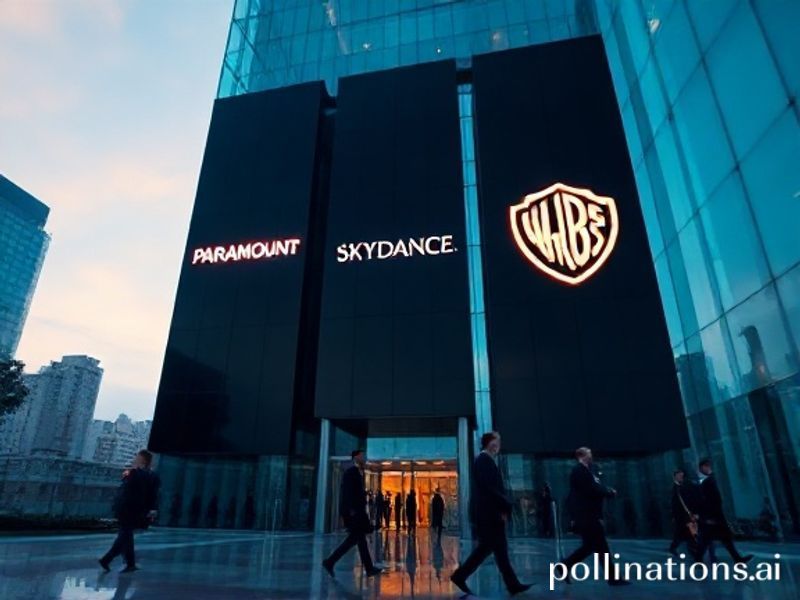Hollywood’s Three-Way Merger Tango: How Paramount, Skydance & Warner Bros Plan to Save Themselves—and Maybe Your Weekend
Paramount, Skydance, Warner Bros: The World Watches Three Aging Gladiators Swipe Right on Each Other
By Our Correspondent in Whatever Time Zone Still Has a Functioning Streaming App
PARIS—Somewhere between the croissant crumbs and the existential dread of another trade-war Tuesday, the entertainment-industrial complex just tried a three-way corporate tango. Paramount Global, Skydance Media, and Warner Bros. Discovery are circling one another like contestants on a very expensive reality show titled “Who Wants to Marry a Declining Linear Channel?” The rest of the planet, nursing both inflation and a lingering Marvel fatigue, looks on with the weary amusement of a bartender watching the last patrons negotiate whose tab gets stuck to whom.
Let’s zoom out, shall we? In a year when half the world is busy fortifying borders and the other half is Googling “how to move to Portugal,” Hollywood’s great powers have decided that the safest geopolitical play is to merge their debt loads and pray. Paramount—once the mountain from which Moses might have streamed the Ten Commandments—now resembles an over-leveraged molehill. Warner Bros. Discovery, fresh off shelving more films than most studios ever green-light, needs content the way a drowning man needs a bigger puddle. And Skydance? The plucky upstart bankrolled by Larry Ellison’s son, proving that even nepo-babies can have a Napoleon complex.
Across the Atlantic, European regulators stroke their chins and mutter “antitrust” the way other people say “bless you” after a sneeze. In Asia, Tencent executives toggle between schadenfreude and spreadsheets, calculating how many K-dramas they can finance with the spare change left after Hollywood’s self-immolation. Meanwhile, Latin American markets—where Netflix still haggles over peso pricing—wonder if a bulked-up U.S. mega-studio will remember they exist or simply dub everything into Spanish and call it “localization.”
The cynical read is that this is less a merger than a fire sale disguised as synergy. Warner Bros. Discovery’s $40-billion-plus debt pile is the kind of number that makes Greek statisticians blush. Paramount, saddled with cable assets about as future-proof as a fax machine museum, needs a lifeline that isn’t just another Yellowstone spin-off. Skydance offers Silicon-Valley swagger and a war chest that smells faintly of Oracle dividends, but also the hubris of a firm that believes “algorithm” is Latin for “creative genius.”
Human nature—never waste a crisis—dictates that executives will dress it up as “global storytelling scale.” Translation: we’re combining so we can fire enough people to make Wall Street cheer for fifteen whole minutes. The international workforce, already fluent in gig-economy precarity, knows the drill: today a red carpet, tomorrow a redundancy Zoom. Viewers from Lagos to Lahore can expect the same caped crusader, now with slightly cheaper visual effects and a Finnish co-financier demanding a sauna cameo.
And yet, there is dark poetry here. In an age when borders harden and diplomacy tweets, the most fluid frontiers remain narrative ones. A teenager in Jakarta bingeing a Batman anime produced by a half-Saudi-financed, half-French-tax-sheltered studio is the closest thing we have to multilateral cooperation. The deal, if it happens, will decide who curates the dreams piped into that teenager’s phone—whether the next dystopia is branded with a mountain, a shield, or whatever Skydance’s logo is (a drone, maybe?).
So the world watches—some with popcorn, some with dread—as three aging gladiators swipe right on each other in a boardroom coliseum. The rest of us, subscribers all, brace for the inevitable: higher prices, longer pre-roll ads, and a cinematic universe so interconnected it requires a PhD in corporate genealogy. Remember: empires fall, but streaming bundles are forever. Or at least until the next quarterly earnings call.
In the end, the merger’s greatest special effect won’t be CGI. It will be the vanishing act performed on jobs, artistic risk, and the quaint notion that stories belong to anyone other than the highest leveraged bidder. But hey—at least we’ll still have subtitles. For now.







